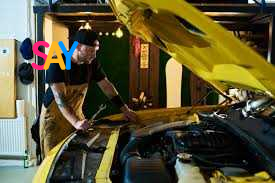
As the automotive industry continues to evolve, one of the most significant shifts has been the rise of hybrid and electric vehicles (EVs). For traditional auto mechanics, adapting to this change has been essential in order to remain relevant and continue providing valuable services. Auto mechanics, once primarily focused on gas-powered engines and the systems that support them, must now expand their knowledge and expertise to include the complexities of hybrid and electric cars. With technological advancements rapidly transforming the landscape of vehicle repair and maintenance, auto mechanics must adapt by learning new skills, investing in specialized tools, and staying current with industry trends.
Understanding Hybrid and Electric Vehicle Technology
The core difference between traditional gas-powered vehicles and hybrids or electric cars lies in their powertrains. Hybrid vehicles combine an internal combustion engine with an electric motor, while electric vehicles rely solely on an electric motor powered by batteries. These vehicles have fewer moving parts than traditional cars, but their advanced technology presents new challenges and opportunities for auto mechanics.
For auto mechanics, one of the primary obstacles when it comes to servicing these vehicles is understanding how their systems work. The battery management systems, regenerative braking, electric motors, and intricate wiring are all critical components that require specialized knowledge. Mechanics must familiarize themselves with high-voltage systems, advanced electronics, and battery charging systems in order to effectively diagnose and repair issues.
The Importance of Specialized Training
Due to the significant differences in vehicle technology, mechanics must undergo specialized training to ensure they can safely and efficiently work on hybrid and electric vehicles. Many training programs now offer certification in hybrid and electric vehicle repair, which provides mechanics with the knowledge they need to handle these new technologies. This training covers everything from the basics of electric motor systems to troubleshooting complex battery management systems.
Mechanics can find these specialized programs through trade schools, online courses, and manufacturer-specific training, such as those offered by Toyota, Tesla, or Nissan. Some programs focus on safety procedures, particularly when working with high-voltage components, which can be hazardous if handled improperly. By investing in such training, auto mechanics can boost their credibility and attract customers who need reliable services for their hybrid or electric vehicles.
Upgrading Tools and Equipment
In addition to upgrading their knowledge and skills, auto mechanics must also invest in new tools and equipment tailored for electric and hybrid vehicles. These vehicles require specific diagnostic tools that can identify faults in their electrical systems, battery packs, and powertrains. For example, hybrid vehicles often have dual systems—gas and electric—that need to be tested simultaneously, while EVs require advanced battery diagnostic tools to assess battery health, charging issues, and performance.
Traditional tools used for gas-powered vehicles, such as those for repairing engines, exhaust systems, and fuel lines, are of little use when working on hybrid or electric cars. Instead, mechanics must incorporate equipment like battery testing devices, thermal cameras for identifying overheating battery packs, and high-voltage isolation tools to ensure safety during repairs. Adapting to these technological changes requires financial investment, but it's necessary for auto mechanics to stay competitive in the market.
Staying Ahead of the Curve with Technology
The automotive industry is moving at a fast pace, and staying ahead of emerging trends is crucial for auto mechanics who want to succeed in the hybrid and electric vehicle market. As more automakers introduce electric models and hybrid options, mechanics must keep up with the latest advancements in vehicle technology. This includes staying informed about new battery technologies, wireless diagnostics, and software updates that can affect vehicle performance.
Many hybrid and electric vehicles now come with advanced software that requires updates, much like a smartphone or computer. Some repairs may even require recalibrating or reprogramming the vehicle's systems, which is a skillset that traditional auto mechanics might not have needed to master in the past. Mechanics must ensure they’re equipped with the necessary software tools and expertise to handle these software-related issues.
The Impact of Hybrid and Electric Cars on the Auto Repair Industry
The rise of hybrid and electric vehicles has already made a significant impact on the auto repair industry. For auto mechanics, this shift presents both challenges and opportunities. While traditional maintenance tasks such as oil changes and exhaust repairs will become less frequent, new opportunities are emerging for mechanics who specialize in electric vehicle diagnostics, battery repair, and electrical system maintenance.
With the increasing number of hybrid and electric cars on the road, there is a growing demand for auto repair professionals who are knowledgeable and experienced in handling these vehicles. Mechanics who invest time in learning about these technologies and obtaining certifications are in a strong position to meet this demand and secure a steady stream of customers.
Conclusion: Staying Adaptable in a Changing Industry
As hybrid and electric vehicles continue to gain popularity, auto mechanics must remain adaptable and committed to continuous learning. By embracing new technologies, undergoing specialized training, and upgrading their tools and equipment, auto mechanics can successfully navigate this transformation. As the industry evolves, so too must auto repair professionals. At InstantCarFix, we understand the importance of staying current with automotive innovations, and we are here to help with all your auto repair needs, whether you're driving a traditional vehicle or a cutting-edge electric car.




